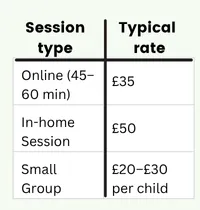Looking for a quick summary? Click on the link above
What does a tutor cost?
Why are some tutors are more expensive than others?
This is a hard question to answer as there are so many variables, but I shall try to answer it as openly and honestly as possible.
There are several reasons why the cost of tutors varies. One reason is purely the perceived value of the tutor themselves.

Perceived Value
Roughly 10 years ago, when my lad was doing his A levels, I arranged for a tutor that I knew and had been recommending to others to come and give him an hour’s support with something Jamie had missed in an Economics lesson.
This tutor turned up with a pen and asked what Jamie would like to concentrate on. Jamie answered him, and the tutor asked what he knew about it. Jamie responded that he didn’t know anything as he'd missed the relevant lesson. The tutor replied that he must know something, and Jamie reiterating that he had missed that lesson. This cycle continued for an hour, then he left. He charged £50/hr + transport for this.
For context, I was charging £20 including transport at the time. I spoke to him about his price, and he replied,
“No one has ever complained about it before.”
So, please be aware that self-perception is sometimes what determines the cost of a tutor, and it is always worth digging deeper to establish what you will get for your investment.
The location of the lesson
Something that is often key in establishing the cost of a tutor is the location of the lesson: online, in the tutor’s home, in your home, or in a generic tutoring centre, for example in a supermarket or shopping centre location.
When a tutor works online, there is little need for them to create or provide physical resources, which will potentially reduce the cost to them of providing the lesson. Additionally, they have no travel expenses, which will also reduce the cost to produce the lesson. However, they will inevitably have to pay for the platform that they provide the lesson on (such as Zoom) and consider their use of electricity, the internet, etc.
If you travel to the tutor’s home, the price will potentially increase as they now have to create physical resources and provide a space that is suitable for the lessons. They may also provide a light snack for the student during the lesson.
If you go to a tutoring session in a tutoring centre, the cost will potentially increase again as they will not only have to (potentially) create physical resources but also pay for the hire of a potentially expensive venue, which will have to be split between the students that they support.
Finally, if the tutor must travel to your home, you will no doubt pay a premium. The first presumption that I will make is that it will be a one-to-one lesson, as it is unlikely that they will invite other students to your home!

(We will look at 1-to-1 sessions, small group, and group sessions in the coming paragraphs.)
This means you will be responsible for the tutor’s travel expenses, their time travelling and during the lesson, and physical resources. They will no doubt have to prepare additional resources to ensure that they have enough to last the entire lesson. Unlike with the other options, it is unlikely that they will have resources to hand that they can just grab should the main work not take as long as initially planned.
Having said that lessons in your own home will potentially be 1-to-1, I worked with a family a few years back and the mum started inviting the child’s friends around to join in. If you do decide to do that, please check that the tutor is happy with this and able to plan and create resources accordingly, rather than just presume that they will be happy with it even though it is your home.
The duration of the lesson
The other thing that will influence the cost of a session is its duration. Lesson times will generally vary between 45, 60 or 90 minutes in length.
Naturally, longer sessions tend to cost more, but some tutors will reduce the cost per minute slightly as the session gets longer. For example, a 90-minute session might not cost exactly double a 45-minute one — i.e. some tutors offer a small discount for longer bookings.
The ideal session length also depends on the age and attention span of the student. Younger children may benefit more from shorter, focused sessions, while older students (especially at GCSE level) often need longer blocks to work through complex topics in depth — which can affect both the price and how a tutor structures their time.
Some tutors also consider the time that it will take for them to prepare for a lesson and the follow-up time after, which is usually factored into the hourly rate and consequently makes longer sessions more efficient.


One-to-one or group sessions
We have touched on this in a previous point, but the number of people attending the lesson will also make a difference. If the lesson is one-to-one, the tutor will inevitably charge more, as that one family is taking full responsibility for the tutor’s time during that period.
However, the larger the number of people in the session, often the lower the individual cost will be, as the tutor is now spreading their time and consequently their attention between multiple students.
There are many pros and cons of individual sessions versus group lessons, which we will consider in a different article, but for now the main consideration is the impact on cost.

What are you expected to provide?
Something else to consider when looking into the cost of having a tutor is the resources that they will provide. Some tutors specialise in supporting a child with their homework and may expect you to provide the homework and the resources required to complete it. They may turn up for the session and rely on their prior knowledge to help complete it.
Others may ask in advance what the homework is so that they can also bring additional resources to complement the homework should it be finished prior to the lesson ending, or to help explain it in a different voice or in better detail. They may also bring materials needed to complete the lesson.
Other tutors will create games and a range of resources for the lesson. When I first started tutoring, I was very much of the mind that every lesson had to be tailored to the needs and likes of the individual. Although I still agree with this philosophy and ensure that every resource is appropriate to their learning style and personal needs, I used to create the games so that if your child was interested in the universe, for example, every card in the game would have an image relating to the universe on the back.
In that respect, my resources are now far more generic, as on occasions it could take me up to 4 hours to prepare for a lesson (every board game was also created by hand, as I didn’t want the parents to in any way think I was cutting corners!).

Additional costs for with a child with SEND
Some people justify charging more for working with a child with special needs. They may have undergone additional training to have the required knowledge, and the time and expense of this training will need to be reimbursed over time. I have done many courses over the years, but I did them for my own benefit. I also believe that although an academic course will point you in the right direction, what is important to remember is that every child is an individual — regardless of a label or not having a label — and it is the responsibility of the tutor to learn about the individual needs of your child and work with those.

Flexible cancellation policies
There are tutors will also charge more for being more flexible with days and cancellations. There are tutors who will charge you for the timeslot once requested and then offer you a partial discount if cancelled within a longer period of time, or no discount if cancelled at the last minute as they will no longer be able to offer this slot to anyone else.
Others will be more flexible, especially if they are working with children with mental or physical health issues or are neurodiverse, as they will be more understanding of the personal situation of that family and/or child. Sometimes this flexibility is hidden within the cost per hour.
Some will be flexible with their time, but less flexible on when the lessons are paid for. If they request payment after the lesson, they may impose a late payment fee because of the time and additional work entailed in chasing late payments.
Experience
A tutor with more experience — either of working in a formal educational environment such as a school, or as an educational assistant in another setting, or as a tutor — will often request a higher fee. Sometimes this is because over time their reputation has grown and the demand for their work has outgrown their availability. This is often when they will take on and train other tutors to work beside them, or they will raise their prices to help them reduce the demand for their support.
When you are looking for a tutor, these are the main considerations regarding what they are charging, and
it is always best to ask that specific tutor what they are charging and what that fee covers.

If you’d like to find out how we work at Clara James Tutoring with flexible, child‑centred sessions tailored to your family’s needs, I’d love to hear from you. There’s no commitment, just a chance to ask questions and explore what might work best for your child. [email protected]
